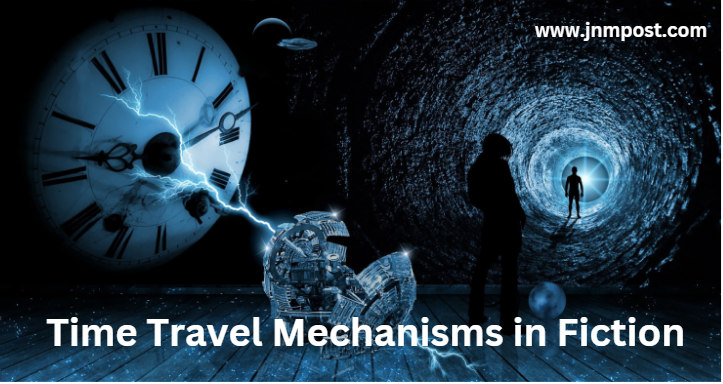Introduction to 2023-1954
Definition of Time Travel
Time travel refers to the concept of moving between different points in time, akin to moving through space. This idea has captivated human imagination for centuries, appearing in various forms in literature, films, and scientific discussions.
Relevance and Importance
The fascination with time travel is not just about the allure of visiting the past or the future; it also reflects a deep-seated human curiosity about the nature of time and our place within it. Understanding the differences and similarities between different eras can provide valuable insights into societal evolution and our collective future.
Objective of the Article
This article aims to explore the concept of time travel through a comparative analysis of the years 2023 and 1954. By examining technological advancements, political landscapes, environmental challenges, and social trends, we aim to understand how these two distinct periods reflect broader historical changes.
The Concept of Time Travel
Historical Background
Time travel as a concept has ancient roots, with early myths and legends often involving characters who move forward or backward in time. The modern fascination with time travel began in earnest in the 19th century with the advent of science fiction.
Time Travel in Literature
Books like H.G. Wells’ “The Time Machine” and Mark Twain’s “A Connecticut Yankee in King Arthur’s Court” popularized the idea of time travel, setting the stage for countless stories that followed. These narratives explore the potential consequences and ethical dilemmas of altering the past or witnessing the future.
Scientific Theories on Time Travel
Scientific theories about time travel often revolve around complex concepts like wormholes, black holes, and the theory of relativity. Albert Einstein’s work laid the groundwork for understanding how time could theoretically be manipulated, while more recent theories suggest potential methods for traveling through time, though practical application remains speculative.
Cultural Significance
Time travel is a powerful tool for examining cultural values and societal norms. By imagining different times, we can reflect on our current beliefs and practices, understanding them in a broader historical context.
The Era of 2023
Technological Advancements
In 2023, technology has reached unprecedented levels of advancement. The proliferation of artificial intelligence, the expansion of quantum computing, and the integration of smart devices into daily life illustrate a society deeply intertwined with technology.
Global Political Landscape
The global political landscape of 2023 is marked by significant tensions and alliances. Issues such as climate change, economic inequality, and international conflicts shape political agendas and diplomatic relations.
Environmental Challenges
Environmental challenges are at the forefront of global concerns in 2023. Climate change, biodiversity loss, and pollution are critical issues that demand immediate and coordinated action from nations worldwide.
Social Trends and Movements
Social trends in 2023 include a heightened awareness of mental health, a push for greater inclusivity and diversity, and a strong movement towards sustainable living. These trends reflect a society that is increasingly conscious of its impact on both individuals and the planet.
Major Events and Milestones
Major events in 2023 include advancements in space exploration, significant political elections, and breakthroughs in medical research. These milestones highlight the dynamic and ever-evolving nature of contemporary society.
The Era of 1954
Post-War Recovery
1954 was a year of recovery and rebuilding after the devastation of World War II. Nations focused on economic growth, infrastructure development, and stabilizing political systems.
Technological Innovations
The 1950s saw significant technological innovations, including the development of early computers, advancements in nuclear energy, and the beginning of the space race. These innovations laid the groundwork for future technological revolutions.
Political Climate
The political climate of 1954 was heavily influenced by the Cold War. The tension between the United States and the Soviet Union dominated international relations, leading to an arms race and numerous geopolitical conflicts.
Cultural Movements
Cultural movements in 1954 included the beginnings of the Civil Rights Movement in the United States and the spread of rock and roll music. These movements reflected a society grappling with issues of equality and cultural expression.
Significant Events and Figures
Significant events in 1954 included the Supreme Court’s decision in Brown v. Board of Education, which began the process of desegregation in American schools, and the development of the polio vaccine by Jonas Salk. These events had profound impacts on society and public health.
Comparing 2023 and 1954
Technological Progress
The technological progress between 2023-1954 is staggering. From early computers to advanced AI, the pace of innovation has accelerated, transforming every aspect of life.
Political Changes
Political changes over this period include the end of the Cold War, the rise of new global powers, and significant shifts in international alliances. These changes have redefined global power structures and political dynamics.
Social Evolution
Social evolution from 2023-1954 reflects changing attitudes towards race, gender, and human rights. Movements for equality and justice have reshaped societal norms and values.
Environmental Awareness
Environmental awareness has grown significantly since 1954. From the establishment of Earth Day in 1970 to the global climate agreements of the 21st century, there is now a widespread recognition of the need to protect our planet.
Economic Shifts
Economic shifts over this period include the rise of the global economy, the digital revolution, and the increasing importance of technology and innovation in driving economic growth.
Key Historical Events Between 1954 and 2023
Civil Rights Movement
The Civil Rights Movement of the 1950s and 1960s brought about significant changes in American society, leading to greater legal and social equality for African Americans.
Cold War Developments
Cold War developments included the Cuban Missile Crisis, the Vietnam War, and the eventual collapse of the Soviet Union in 1991. These events shaped global politics for decades.
Space Race and Moon Landing
The space race culminated in the moon landing in 1969, a landmark achievement that demonstrated human ingenuity and the possibilities of space exploration.
Digital Revolution
The digital revolution transformed communication, commerce, and daily life. The rise of the internet, mobile technology, and social media has created a connected and information-rich world.
Globalization
Globalization has interconnected economies and cultures, leading to increased trade, cultural exchange, and international cooperation.
Climate Change Awareness
Climate change awareness has grown over the decades, leading to international agreements and efforts to mitigate environmental damage and promote sustainability.
Time Travel Mechanisms in Fiction
Classic Time Travel Stories
Classic time travel stories include H.G. Wells’ “The Time Machine,” which explores the possibilities and perils of time travel, and Ray Bradbury’s “A Sound of Thunder,” which examines the consequences of changing the past.
Modern Interpretations
Modern interpretations of time travel include more nuanced and scientifically grounded approaches, such as in films like “Interstellar” and “Tenet,” which explore the complexities of time and space.
Popular Movies and TV Shows
Popular movies and TV shows featuring time travel include “Back to the Future,” “Doctor Who,” and “The Terminator.” These stories have captivated audiences and contributed to the cultural understanding of time travel.
Influence on Popular Culture
The influence of time travel on popular culture is significant, inspiring countless stories, debates, and imaginative explorations of what might be possible.
Scientific Possibilities of Time Travel
Theoretical Foundations
Theoretical foundations of time travel include concepts from Einstein’s theory of relativity, which suggests that time dilation could allow for different experiences of time under certain conditions.
Prominent Scientists’ Views
Prominent scientists like Stephen Hawking and Kip Thorne have contributed to the discussion on time travel, offering insights and theoretical models for how it might be possible.
Current Research and Experiments
Current research and experiments in time travel involve studying quantum mechanics, exploring the nature of black holes, and investigating potential ways to manipulate spacetime.
Future Prospects
Future prospects for time travel remain speculative but intriguing. Advances in technology and a deeper understanding of the universe could one day make time travel a reality.
Personal Reflections
Imagining Life in 1954
Imagining life in 1954 involves considering a world without the internet, where communication was slower, and daily life was shaped by different technological and social norms.
Experiences of Individuals from 2023
Experiences of individuals from 2023 reflect a world where technology is integral to daily life, global connectivity is taken for granted, and social issues are viewed through a modern lens.
Impact of Historical Knowledge on Personal Views
Historical knowledge impacts personal views by providing context for current events and helping individuals understand the origins and developments of societal trends and issues.
Expert Insights
Historians’ Perspectives
Historians’ perspectives on time travel and historical comparison offer valuable insights into how societies evolve and the factors that drive change.
Scientists’ Opinions
Scientists’ opinions on the feasibility of time travel and the potential implications of manipulating time provide a fascinating glimpse into the future of scientific discovery.
Cultural Analysts’ Views
Cultural analysts’ views on the impact of time travel stories on society highlight the power of imagination and narrative in shaping cultural understanding and values.
FAQs
What is the origin of time travel concepts?
The origin of time travel concepts can be traced back to ancient myths and legends, but the modern fascination began with 19th-century literature, particularly the works of H.G. Wells.
How have technological advancements shaped our understanding of time?
Technological advancements, especially in the fields of physics and computing, have deepened our understanding of time, revealing its complexity and the potential for manipulation.
What are the major differences between 1954 and 2023?
Major differences between 2023-1954 include technological advancements, shifts in political power, changes in social norms, and increased environmental awareness.
Is time travel scientifically possible?
Time travel is theoretically possible according to certain scientific theories, but practical application remains speculative and far from being realized.
How has time travel influenced popular culture?
Time travel has had a significant influence on popular culture, inspiring numerous stories, movies, and TV shows that explore the possibilities and consequences of moving through time.
Conclusion
Summary of Key Points
This article has explored the concept of time travel through a comparative analysis of 2023-1954, examining technological advancements, political landscapes, environmental challenges, and social trends.
Reflection on the Journey Through Time
Reflecting on the journey through time reveals how much has changed and how certain themes, such as the quest for progress and the struggle for equality, remain constant.
Call to Action for Further Exploration
Readers are encouraged to delve deeper into the fascinating subject of time travel, exploring both the scientific possibilities and the rich tapestry of stories that continue to captivate our imaginations.






Be First to Comment